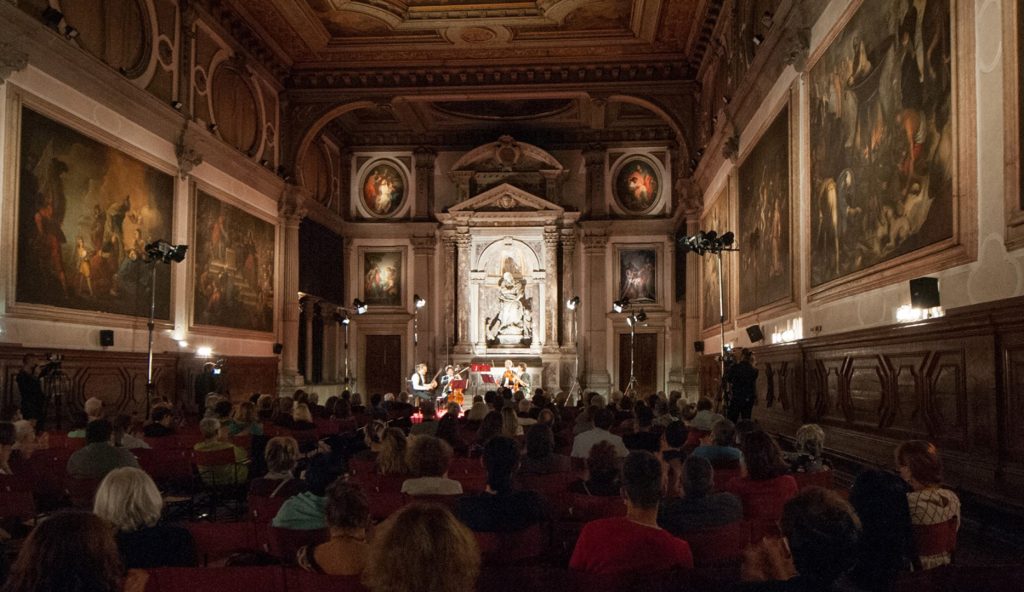
81. Venice Film Festival

80. Venice Film Festival

79. Venice Film Festival

The Biennale Arte Guide
Foreigners Everywhere

The Biennale Architecture Guide
The Laboratory of the Future

The Biennale Arte Guide
Il latte dei sogni

“Mirroring Worlds” runs through September and October with concerts and conferences that investigate foreign influences on nineteenth-century French music.
Palazzetto Bru Zane has accustomed Venetians and visitors to a festival-like atmosphere even in the breaks between themed programmes. In the 19th century, foreign countries far and near, real or imagined, inspired French music to reflect on its own identity and context. Palazzetto Bru Zane dedicates Mirroring Worlds, a series of seven concerts and two conferences, from September 12 to October 27 in Venice, to these foreign inspirations. The piano takes the spotlight on September 12 with Célia Oneto Bensaid performing works by Godard, Bonis, and David. On September 23, accompanied by pianist François Dumont, Jodie Devos and Éléonore Pancrazi embark on a journey with a selection of arias and duets from Spain, Portugal, India, and Japan. The following day, pianists Ismaël Margain and Guillaume Bellom present Cécile Chaminade’s La Sévillane and Camille Saint-Saëns’ Caprice arabe. Luigi Attademo’s guitar will take us to Spain on October 3 with pieces by Sor, Aguado, and Tárrega. On October 12, a cello and piano concert will feel like an evening in a faraway country, alternating introspection (Louis Vierne’s Soirs étrangers) with the joy of dance (Jacques Offenbach’s Danse bohémienne).
In this unique occasion, the concerts become diary entries of a journey. On October 17, Salome Jordania performs solo piano works by Mel Bonis, Claude Debussy, Benjamin Godard, and Maurice Ravel. Following a concert for violin, cello, and piano spanning East (Mel Bonis’ Suite orientale) and West (Benjamin Godard’s Barcarolles) on October 19, the festival concludes on October 27 with a four-hand piano programme by sisters Lidija and Sanja Bizjak. They take the audience on a journey to Algeria (Camille Saint- Saëns’ Suite algérienne), Egypt (Mel Bonis’ Le Songe de Cléopâtre), and India (Cécile Chaminade’s Danse Indoue). During the 19th century, as industrial revolutions and steam trains emerged, the Orient, romanticized in stories and explorers’ tales, became accessible to affluent Europeans. For the less fortunate, illustrations in magazines offered glimpses into different worlds. In French music production of the 19th century, opera plots were often set outside national borders, with foreign dances enriching a significant portion of the instrumental repertoire
To give Parisian opera-goers a taste of exoticism, works would be set in faraway lands, from Spain and Portugal – departure p...
Ismaël Margain and Guillaume Bellom take us on a musical journey rich in rare tones, thanks to the somewhat unusual combinatio...
In the nineteenth century the guitar enjoyed the same popularity among the lower and middle classes as the piano (a much more c...
Luois Rodde’s cello and Gwendal Giguelay’s piano reflect on how a context other than one’s homeland may influence artisti...
Georgian pianist Salome Jordania is an award-winning young pianist who toured Germany, Azerbaijan, Armenia, Ukraine, Russia, an...
Since the early twentieth century, regional dialects have been influencing the French musical discourse. Ravel’s Trio ave...
Sisters Lidija and Sanja Bizjak studied in Belgrade before enrolling in Jacques Rouvier’s classes at the Paris Conservatory. ...